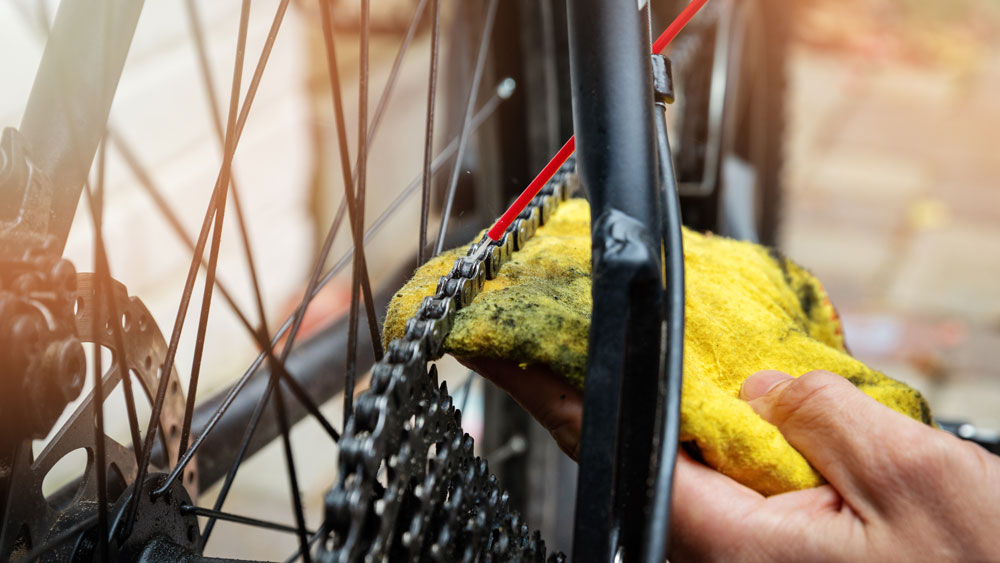Winter Bike Maintenance Tips To Keep You Riding Through To Spring
Winter can be tough on a bike, but regular care and attention will keep your ride on the road

Amid the approaching gloom of darker, colder seasons, we have some good news for you: people in the UK are cycling more. We’d wager that’s mostly down to continuing an activity taken up during lockdown, avoiding the hell that is rush-hour traffic or finding an alternative to crowded public transport on the return to work. And given most of last winter was spent in lockdown, we expect that a lot of new riders are about to experience their first winter of cycling.
More good news: it’s not half as bad as you might imagine – but the same isn’t true for the bike. The winter is hard on a bike for all the same reasons that you might not fancy cycling as much yourself, except with added salt.
“The salt is the shocker really,” says Julian Thrasher, head of training for Madison. “When it gets particularly cold and they grit the roads, all of that comes off and it lands on the bike and you get this perfect storm of corrosion with the damp, the cold and the salt all working together to strip all the grease and oil off your bike.”
At best, that will result in cycling becoming harder and hefty repair bills come spring, so we asked Thrasher to outline what people should do to look after their bike during the winter months.
Which parts of a bike are most affected by winter?
The drive train [which broadly refers to the chain and everything it touches] and your brakes are going to be most affected. A car hides everything that’s delicate away. All the gears are in a gearbox that is submerged in oil. On your bike, they’re all out on display. That’s why you have to oil the chain. Then it’s any moving parts as well and anywhere that water can sit. Things like exposed bolts, bottle cage bolts, they can suffer from corrosion, and any exposed cables as well.
What’s the best thing you can do to look after your bike during winter?
When you get back from a ride give the bike a very quick rinse off, dry it down and add a bit of lubricant. That’s the thing that people tend not to do. Maybe it gets a tarp bunged over the top of it and a bungee cord, but if it’s outside, it’s cold and damp and the bike never gets a chance to really dry off.
If you’re lucky enough to have a garage or a little porch that’s dry, bring the bike inside and give it a quick five- or 10-minute clean. That’s going to stop all the road dirt and salt sticking to the bike and causing problems.
Get the Coach Newsletter
Sign up for workout ideas, training advice, reviews of the latest gear and more.
Would doing it every week, rather than every ride, be OK?
For sure. Just don’t get lazy with it. I must admit I did a 60-mile gravel ride and it was really boggy and I got back and at that point I’m like, “I’m not cleaning it, I’m done, I just want to go in and have some soup!” But I put it in a warm, dry garage, and that made the mud dry out. I took it out for another ride and then I cleaned it, but I did oil the chain before I took it out again.
What should you do before and after winter?
Book a full service to make sure your bike’s in the best condition to survive winter. Make sure that grease is inside everything, that your hubs [the centre of your wheels] are OK, and that the chain’s not too worn, because winter is going to accentuate anything that’s slightly worn. Then essentially it’s keeping it clean with a bit of lube.
See related
- Bike Maintenance Basics For Commuters
- Spring Clean Your Bike With This Five-Step Plan
- The Best Hybrid Bikes For Commuters
Do you have any other general maintenance tips?
The more you can spend on good-quality bike-specific washing gear, the easier it is going to be. Some wiping rags and the Finish Line bike wash are the things I would point you at, along with chain lube. Use bike-specific lubricant, because a motorcycle chain lube will really gunk things up quickly.
Another suggestion would be to consider your choice of lubricant depending on the conditions you’re riding in. In a month when it’s just cold and it doesn’t rain at all, a wet lube might be a bit too much. In my experience if you use a wet lube all the time it does make your drive train dirty because it’s quite a thick lubricant. The dry lube is more like water, so it’s not retained on the chain as well.
Also, when lubing the bike make sure that the lube doesn’t go on to the disc rotors if you’ve got disc brakes. It’s very easy to put too much lube on the chain as well. I see that happen and that causes problems.
Another tip would be to avoid the car pressure washer when you’re at your service station. This might seem a bit counterintuitive, because you watch the pro teams and they clean the bikes off with the pressure washer. But those bikes get taken apart, fully rebuilt, put back together again, and fully regreased.

Nick Harris-Fry is a journalist who has been covering health and fitness since 2015. Nick is an avid runner, covering 70-110km a week, which gives him ample opportunity to test a wide range of running shoes and running gear. He is also the chief tester for fitness trackers and running watches, treadmills and exercise bikes, and workout headphones.
